So, you know how everyone’s always like, “Prevention is key, man!” Well, that’s true, especially when it comes to dodging those nasty colds and flu. Forget those quick fixes you find in drugstores – nature’s got your back with some bomb spices that can seriously boost your immunity and help your body bounce back. We’re talking about the best spices for flu and cold recovery – these bad boys have been holding it down for centuries, fighting off illnesses and keeping peeps healthy.
Incorporate these spice legends into your daily grind, and you’re leveling up your body’s defenses, possibly even avoiding those sick days. Wanna know more about the epic health perks of these spices? Keep scrolling!
Understanding Cold and Flu

Cold and flu, they’re like these annoying viruses that spread super easily, jumping from person to person. They mess with your nose, throat, and lungs, making you cough, feel all congested, and just plain crappy. Picture this: sore throat, fever, and you’re dead tired – that’s the deal with these bugs.
And get this, these germs love crashing our parties more in the fall and winter when we’re all huddled indoors, making it easier for them to spread like wildfire. Now, colds, they’re like the annoying friend who overstays their welcome for a few days to a week. Flu, on the other hand, is that drama queen who hits you harder and sticks around for up to two weeks or more. Plus, it can get really nasty, especially if you’re a kid, an older adult, or someone with a weak immune system. So, wash those hands and cover your mouth! Stay healthy out there!
Prevention and Treatment
Keeping those nasty colds and flu at bay? Easy peasy. First off, wash those hands like you’re scrubbing in for surgery, okay? And don’t be touching your face all the time – germs love hanging out there. Plus, stay clear of sick peeps, no need to catch what they have.
Oh, and here’s a pro tip: get that flu shot! It’s like putting on a shield against the flu, seriously.
Now, if you do catch a virus, ain’t no biggie. Rest up, guzzle down those fluids like it’s your job, pop some over-the-counter meds to feel better, and for the love of health, keep your distance from others. We don’t want your germs making the rounds, right?
But hey, real talk, if things get serious – like you’re struggling to breathe, feeling chest pain, or your fever’s through the roof – don’t wait. Hit up the doc ASAP.
The Importance of Immunity
Let’s talk about immunity, aka your body’s defense mechanism against all the nasty stuff out there – infections, diseases, viruses, you name it. It’s like this superhero team made up of organs, cells, and proteins, all working together to keep you safe from harmful invaders.
Now, when it comes to battling those pesky cold and flu viruses, having a rock-solid immune system is key. It’s the OG defender, identifying and taking down those bad guys, stopping them from wreaking havoc inside you.
Pause for a moment; life may present unexpected challenges. Factors such as an unhealthy diet, inadequate sleep, tension, and health issues can diminish your body’s defenses, making you susceptible to infections.
But fear not! We possess the ability to enhance our immune system. Making minor adjustments like ensuring proper sleep, adopting a balanced diet, handling stress, and consuming foods that enhance immunity can strengthen our defenses and safeguard us from illnesses.
Ways to Boost Your Immunity
Here are some simple ways to support your immune system:
- Eat a balanced diet rich in fruits, vegetables, and whole grains
- Exercise regularly
- Get enough sleep
- Manage stress through relaxation techniques such as meditation or yoga
- Stay hydrated
Besides the lifestyle upgrades, here’s the tasty part – adding some killer immune-boosting foods to your plate is a game-changer. We’re talking about the spice squad – turmeric, ginger, garlic, cinnamon, cayenne pepper, and cloves. These flavor-packed champs have natural superpowers that back up your immune system and kick infections to the curb.
So, let’s treat our bodies right and spice up our diet. It’s the secret sauce to fortify our immune systems and stay fit as a fiddle 24/7.
Turmeric: The Golden Spice
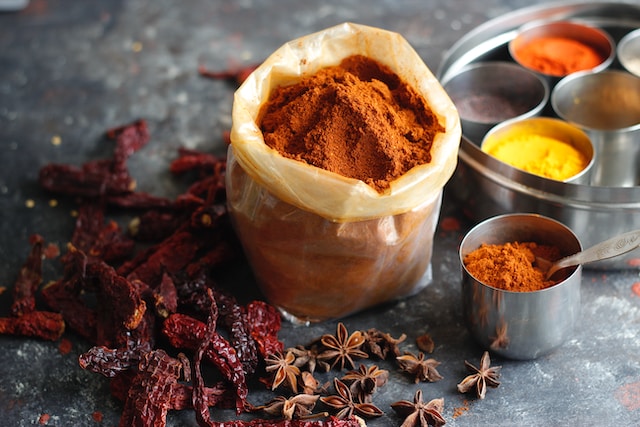
Let’s talk turmeric – this valuable treasure has long been a staple in traditional medicine, particularly for combating cold and flu viruses. The secret weapon? Curcumin. This vital element in turmeric delivers potent anti-inflammatory and antioxidant properties. Incorporating turmeric into your diet isn’t merely about enhancing taste; it’s akin to offering your immune system a congratulatory gesture and a boost button for recovery.
The Benefits of Turmeric for Cold and Flu
Turmeric is a great spice to help alleviate symptoms associated with cold and flu. The following are some of the benefits of turmeric:
- Reduces inflammation: Curcumin in turmeric has strong anti-inflammatory properties, which limits the severity of inflammation in the body and reduces swelling in the nasal passages and sinuses.
- Relieves pain: Turmeric acts as a natural pain reliever, reduces muscle and joint pain, and alleviates headaches.
- Boosts immunity: The antioxidants in turmeric stimulate and strengthen the immune system, making it more efficient at fighting off cold and flu viruses.
- Thins mucus: Turmeric has natural expectorant properties that help to thin the mucous membranes and make them easier to cough up, thereby providing relief from congestion and coughs.
How to Incorporate Turmeric into Your Diet
Turmeric can be easily incorporated into your diet in a variety of ways. Try adding it to your morning smoothie, sprinkling it on roasted vegetables, or mixing it into your favorite curry recipe. Here’s a simple recipe to get you started:
| Golden Milk Recipe |
| Ingredients: |
| 1 cup unsweetened almond milk (or milk of choice) |
| 1/2 tsp turmeric powder |
| 1/4 tsp ground ginger (or fresh grated ginger) |
| 1/4 tsp ground cinnamon |
| 1 tsp honey (optional) |
| Instructions: |
| 1. Heat the milk in a small saucepan over medium heat until steaming. |
| 2. Whisk in the turmeric, ginger, and cinnamon until well combined. |
| 3. Add honey if desired. |
| 4. Pour into a mug and enjoy! |
Incorporating turmeric into your diet is akin to providing your immune system with a complete transformation. It’s akin to having a loyal ally in the fight against cold and flu adversaries. However, don’t jump the gun. If uncertainty lingers or your symptoms persist, consult a healthcare professional for accurate information. Your well-being is invaluable!
Ginger: Nature’s Healer
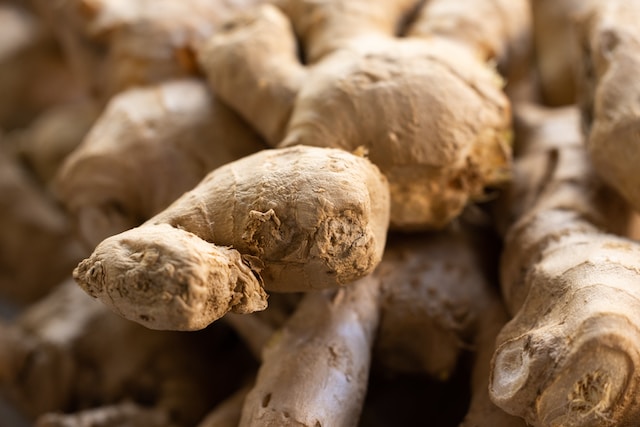
Ginger, your ultimate natural remedy! It’s been used for centuries, and there are some solid reasons why. This fragrant spice serves as a powerhouse, delivering a potent combination of anti-inflammatory and antioxidant properties. In the battle against colds and flu, ginger stands as a reliable ally.
Seriously, research has demonstrated ginger’s ability to alleviate a sore throat, relieve coughs, and alleviate stubborn congestion. Its antimicrobial abilities even deal infections a double blow. But hold on, there’s an additional benefit! Ginger acts as a mediator, reducing inflammation in your body, thereby reducing discomfort and minimizing the risk of hidden chronic ailments.
Ways to Incorporate Ginger into Your Diet
| Recipe | Description |
| Ginger Tea | Steep fresh ginger in hot water for a soothing drink. |
| Ginger Smoothie | Add fresh ginger to your favorite smoothie recipe for an extra immune boost. |
| Ginger Stir-Fry | Grate fresh ginger and add it to your favorite stir-fry recipe. |
Whether you prefer to enjoy ginger in a tea, smoothie, or meal, this spice is a versatile and delicious addition to any diet. By incorporating ginger into your routine, you can tap into its numerous health benefits and support your immune system during cold and flu season.
Garlic: Nature’s Antibiotic
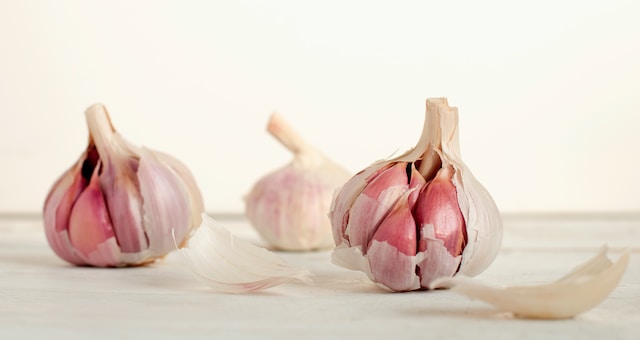
Garlic has been the go-to cure for centuries, and there’s a good reason for it. Inside this tiny bulb, there’s a powerhouse compound called allicin, and it’s packed with antimicrobial and antiviral properties. Eating garlic is like giving your immune system a turbo boost to go head-to-head with those cold and flu nasties.
But hold on, there’s an additional perk! Garlic emits an anti-inflammatory aura that acts as a comforting balm for your sore throat and congestion. It truly shines as a Most Valuable Player (MVP) in maintaining respiratory health, ensuring everything remains in excellent condition, and reducing the likelihood of bothersome respiratory infections.
Wondering how to incorporate garlic into your meals? Here are some simple and delicious ways to enjoy this potent ingredient:
| Recipe | Ingredients |
| Garlic Roasted Vegetables | Assorted vegetables (such as broccoli, carrots, and cauliflower), garlic cloves, olive oil, salt, and pepper |
| Garlic Bread | French bread, garlic cloves, butter, and parsley |
| Garlic Chicken | Chicken breasts, garlic cloves, olive oil, salt, and pepper |
Garlic isn’t just a kitchen staple; it’s a health superhero that can amp up your dishes in a flash. Toss it in soups, stir-fries, or marinades – the options are endless, and so are the benefits!
But here’s the insider tip: the genuine magic unfolds with fresh garlic. While supplements may contain allicin, they can’t replicate the complete goodness offered by the real thing. So, dice up that fresh garlic and let its magic enhance your meals.
Enhancing your immune system and fostering overall well-being? That’s the garlic’s secret recipe! Naturally, if you ever feel uncertain about altering your diet, consult a healthcare professional for expert guidance.
Cinnamon: A Sweet Defense

Cinnamon, the spice with benefits! It’s not just about adding flavor – this sweet gem is a powerhouse during cold and flu season. Packed with antioxidants, anti-inflammatory, and antimicrobial properties, cinnamon isn’t just making your food taste awesome; it’s also giving your immune system a major high-five against infections!
The Health Benefits of Cinnamon
Cinnamon has been used for centuries in traditional medicine practices to treat a range of health conditions. Here are some of the key benefits of this powerful spice:
- Antimicrobial properties: Cinnamon has been shown to have antimicrobial effects against a variety of bacteria and fungi, making it a powerful natural remedy for infections.
- Anti-inflammatory properties: Cinnamon contains compounds that can help reduce inflammation in the body, which can be particularly beneficial for those with respiratory issues.
- Antioxidant properties: Cinnamon is rich in antioxidants that help protect your cells from damage caused by free radicals, which can contribute to the development of chronic diseases.
- Blood sugar regulation: Cinnamon has been shown to help regulate blood sugar levels, which can be beneficial for those with diabetes or pre-diabetes.
How to Incorporate Cinnamon into Your Diet
There are many ways to add cinnamon to your diet, including:
| Food/Drink | Ways to Add Cinnamon |
| Oatmeal | Sprinkle cinnamon on top |
| Smoothies | Add a teaspoon of cinnamon to your blend |
| Coffee/Tea | Stir in a pinch of cinnamon |
| Baked Goods | Add cinnamon to muffins, bread, or cookies for a warm, spicy flavor |
By adding cinnamon to your diet, you can help strengthen your immune system and protect your body from infections. Plus, it’s a delicious and easy way to add flavor to your meals!
Cayenne Pepper: Spicing up Recovery
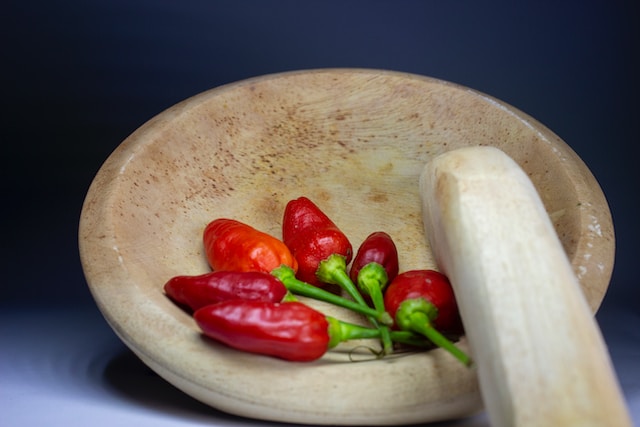
Check this out! Cayenne pepper isn’t just your typical spice with a kick – it’s lowkey a health booster, especially when you’re battling that nasty cold or flu. Not only does it bring the heat, but it’s packing some serious health benefits too!
So, get this: the secret sauce in cayenne pepper is called capsaicin, and it has anti-inflammatory and pain-relieving properties. Imagine it swooping in, kicking out congestion, taming that fever, and soothing all those annoying body aches that come with being sick. And guess what? It’s all natural!
But wait, there’s more! Cayenne pepper is like a boost for your immune system. It’s got this vitamin C action going on that revs up your white blood cells – you know, the cells that fight off infections and keep you healthy. So, basically, it’s like giving your immune system a power-up!
And here’s the best part – you don’t have to be a spice guru to enjoy these benefits. Just sprinkle a little cayenne pepper magic into your soups, stews, or smoothies. It won’t overpower your taste buds, promise!
Black Pepper: Beyond the Spice Rack
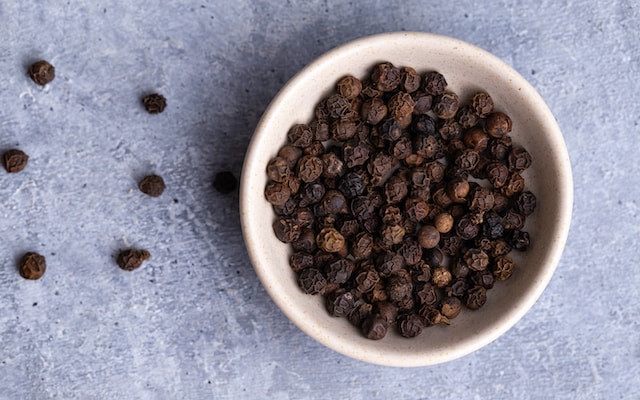
Let’s talk about black pepper – you know, that essential spice that’s probably sitting on your kitchen table right now? Well, it’s way more than just a flavor explosion! Brace yourselves for this spicy revelation: black pepper is a total boss when it comes to boosting your immune system and helping you kick that pesky cold or flu to the curb.
Picture this: you’re all congested, feeling like a balloon about to burst. Fear not, because black pepper’s got your back! Studies suggest that it can unleash the power of mucus flow, clearing up your airways and making you feel less like a stuffed-up mess. It’s basically a pump for your respiratory system, helping you breathe easy and wave goodbye to congestion woes.
But hold on, the awesomeness doesn’t stop there! Black pepper also packs some serious antimicrobial properties, meaning it can go head-to-head with those annoying cold and flu viruses. It’s like having a tiny army of pepper warriors defending your health and well-being. Who knew, right?
So next time you’re seasoning your food, remember – black pepper isn’t just spicing up your meal, it’s spicing up your health game too!
Incorporating Black Pepper in the Diet
| Benefits of Black Pepper for Cold and Flu | How to Incorporate Black Pepper into Your Diet |
| Stimulates mucus flow and clears congestion | Add freshly ground black pepper to soups, stews, and stir-fries |
| Has antimicrobial properties that can help fight off viruses | Sprinkle black pepper on roasted vegetables and eggs |
| Contains vitamin C, which can support immune function | Mix black pepper with honey and lemon in hot water for a soothing beverage |
Black pepper also contains vitamin C, an essential nutrient for immune function. By incorporating black pepper into your meals, you can support your body’s natural defense mechanisms and aid in a speedy recovery from cold and flu.
Try adding freshly ground black pepper to soups, stews, and stir-fries, or sprinkle it on roasted vegetables and eggs. You can also mix black pepper with honey and lemon in hot water for a soothing beverage.
Overall, black pepper is an easily accessible and versatile spice that can offer numerous benefits for your immune system and overall health.
Cloves: Nature’s Antiviral Agent
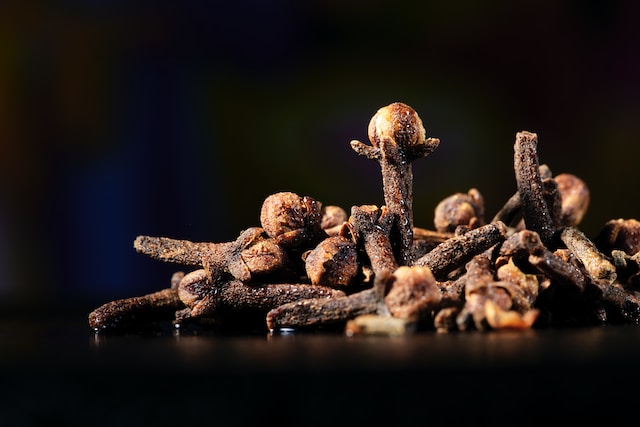
Let’s talk about cloves – those tiny, dried flower buds that pack a serious punch against cold and flu viruses. These little warriors aren’t just aromatic, they’re armed with powerful antiviral properties that can kick those pesky coughs and respiratory issues to the curb!
Get this: a study straight outta 2017, published in the Journal of Immunology Research, spilled the details on cloves’ secret properties. Turns out, they’re legit effective against the flu! In animal models, researchers found that clove extracts put the brakes on the flu virus – slowing down its growth and replication. It’s basically like giving the virus a taste of its own medicine!
So, if you’re feeling under the weather, cloves might just be your new best friend. They’re not just for holiday baking – sprinkle them in your tea, add them to soups, or even munch on them whole (if you’re feeling adventurous).
The Benefits of Cloves:
- Anti-inflammatory properties: Cloves contain compounds that have anti-inflammatory effects, helping to reduce inflammation and swelling in the throat and respiratory tract.
- Antioxidant properties: Cloves are high in antioxidants, which help to protect against cellular damage and support a healthy immune system.
- Pain relief: Eugenol, a key compound in cloves, has analgesic properties that provide pain relief for sore throats and coughs.
- Respiratory health: Cloves are known to have a soothing effect on the respiratory system, helping to clear congestion and ease breathing.
So, how can you incorporate cloves into your diet? One simple way is to add a pinch of ground cloves to your morning oatmeal or smoothie. You can also use whole cloves to infuse flavor into stews, soups, and broths, or crush them and add them to spice blends for meats and vegetables.
| Recipe Idea: | Spiced Apple Cider |
| Ingredients: |
|
| Instructions: |
|
By incorporating cloves into your diet, you can harness the power of this natural antiviral agent and support your respiratory health during cold and flu season.
Conclusion
And there you have it – your guide to spicing up your health and boosting your immunity against those pesky colds and flu! Remember, the power of natural spices is real, but it’s essential to consult with a healthcare professional before making any big changes to your routine.
As you venture forward on your wellness journey, don’t forget the basics: wash your hands, strengthen your immunity, and get moving! These simple habits team up with the spice magic to keep you feeling your best.
Thanks for hanging out and learning about the incredible world of spices with us. Stay healthy, stay vibrant, and never forget to keep spicing things up in life! Until next time, take care and keep shining bright!
To learn more about spices that can boost your immune system, just click here!

